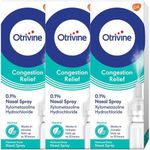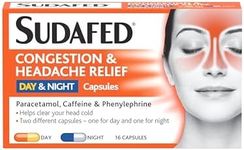Buying Guide for the Best Decongestants
When choosing a decongestant, it's important to understand how these medications work and what specific features or ingredients might be best suited to your needs. Decongestants are used to relieve nasal congestion, often caused by colds, allergies, or sinus infections. They work by narrowing the blood vessels in the nasal passages, which reduces swelling and congestion. However, not all decongestants are created equal, and selecting the right one involves considering factors such as the form of the medication, active ingredients, duration of action, and any potential side effects. Understanding these aspects will help you make an informed decision that aligns with your health needs and lifestyle preferences.Active IngredientThe active ingredient in a decongestant is the chemical compound that provides the therapeutic effect. Common active ingredients include pseudoephedrine and phenylephrine. Pseudoephedrine is often considered more effective but may have more restrictions due to regulations, while phenylephrine is more readily available but might be less potent for some users. Choosing the right active ingredient depends on your personal health needs and any potential sensitivities or allergies. If you have high blood pressure or other cardiovascular concerns, consult with a healthcare provider before choosing a decongestant.
Form of MedicationDecongestants come in various forms, including tablets, capsules, liquids, nasal sprays, and inhalers. Tablets and capsules are convenient for those who prefer oral medication, while nasal sprays and inhalers provide direct relief to the nasal passages and may work faster. Liquid forms can be easier to swallow for those who have difficulty with pills. Your choice should depend on your preference for administration and how quickly you need relief. Nasal sprays should be used with caution to avoid dependency or rebound congestion.
Duration of ActionThe duration of action refers to how long the decongestant will provide relief. Some decongestants offer short-term relief, lasting a few hours, while others are designed for extended relief, lasting up to 12 hours. If you need consistent relief throughout the day, a longer-acting decongestant might be more suitable. However, if you only need relief for a short period, a quick-acting option could be sufficient. Consider your daily schedule and how often you can or want to take medication when choosing the duration.
Side EffectsSide effects are the unintended effects that can occur with decongestant use. Common side effects include increased heart rate, insomnia, dizziness, and nervousness. It's important to be aware of these potential side effects, especially if you have pre-existing health conditions that could be exacerbated. If you are sensitive to medications or have conditions like hypertension, you may need to choose a decongestant with fewer side effects or consult a healthcare provider for advice. Understanding your own health profile will guide you in selecting a decongestant that minimizes adverse effects.
















